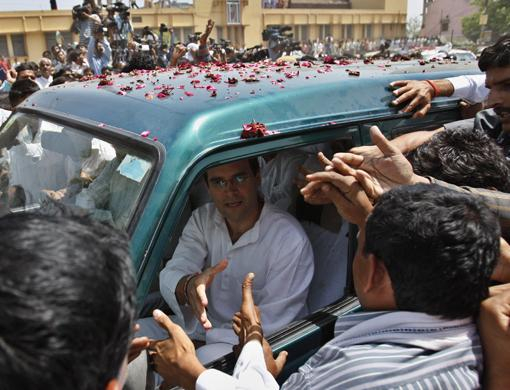
Some 80,000 farmers gathered near Parliament House in New Delhi recently to protest the paltry compensation paid by the government for the land it took over in "public interest". An act as old as 1847, empowers the state to acquire land in dire eventuality.
The UP government has taken over hundreds of hectacres to build an express road corridor for industry. True, the state is paying more or less the market price, as enjoined by a Supreme Court ruling. But the farmers' contention is that the land is their only asset and if it is taken away, they are left with only the cash, which does not give a living to future generations depending on farming for livelihood.
Is invoking "public interest" for industrialists justified? Essentially, it raises the same old question: how far the land or natural resources can be appropriated in the name of development? With the emphasis on growth, the question has assumed importance for the government and the people.
It is a similar situation which forced the government to dilute the scheme of Special Economic Zone (SEZ). Large tracts were acquired "in public interest" and passed on to big industrial or business houses, which would put up a factory on a small tract of land and use the rest, hundreds of acres, to establish hotels and entertainment facilities. Protests forced the government to dilute the scheme. Now that there is pressure on the UP government — one farmer is on fast unto death — it can consider applying the same formula.
Therefore, the amendment to the Land Acquisition Act was a foregone conclusion. Unfortunately, politics has devalued such an altruistic step. Rahul Gandhi, the Gandhi family's rising star, announced his opposition to the Act, while addressing the farmers' rally. The government has promised to follow his advice.
Not first time
But this is not the first time that the government has allowed him to take the credit for "doing good". Only a few days ago did he succeed in having a project wound up in Orissa where the tribals were up in arms. They were against the installation of a factory next to a mine-mound which they worshipped. The centre is probably right in rejecting the project on environmental grounds. But must it be shown to be at the behest of Rahul Gandhi?
At least the farmers in Punjab have a grievance. On reports of rotting food grains, the Supreme Court appointed commissioners to ascertain the fact. They have reported to the apex court that as much as 50,000 metric tonnes of grain have already gone bad. They blamed officials' negligence as ‘genocidal' and recommended responsibility and accountability be fixed at the highest level in central and state governments.
They also warned that this is just a third of the 137,000 tonnes of wheat lying in the open since 2008-09 in Punjab, and the entire lot could have become unfit for consumption as the Food Corporation of India norms allow grain to be exposed to nature for only one year. In Haryana also 31,574 tonnes of grain have been lying in the open since 2008-09.
Food grains row
The rice, which the farmers in Punjab grew last year, has not yet been picked up. All warehouses are full to capacity. The new crop will arrive in three weeks' time. Agriculture Minister Sharad Pawar, ordered by the Supreme Court to distribute the rice lying in the open free of charge to the poor, hesitated before the court pulled him up. Pawar's heart seems to be more in cricket (as president of the International Cricket Council) than in the ministry he heads. A sensitive person would have resigned long ago.
The mishandling of food grains is only one example. The shame of Commonwealth Games is another. The government does not seem to be doing anything competently. It reflects some kind of panic in the ruling party. Elections are three-and-a-half years away. No doubt, the party has lost some ground because of its ridiculous stand on the nuclear energy bill.
Yet there is no viable opposition emerging on the scene. The communists, who have been reduced from 60 to 16 in the Lok Sabha, look like losing even their citadel, West Bengal, in the state elections due next year. The Bharatiya Janata Party is not gaining either. It will soon be in the midst of the Babri Masjid-Ram Janmabhoomi controversy — the court's judgment is due by the end of September.
In fact, this is an ideal time for the Congress to rise above politics and take certain decisions which have long been pending. For example, the draconian laws which have shrunk space for democracy need to be withdrawn. In particular the Armed Forces Act, which gives the armed forces the power to kill without being held accountable. The withdrawal of the 52-year-old law could help bring to an end the 10-year-old agitation in Manipur.
One would have expected Prime Minister Manmohan Singh or the powerful Congress president Sonia Gandhi to take control of the situation. But it is Rahul Gandhi coming to the people's rescue. It does not take time to add two to two.
Kuldip Nayar is a former Indian High Commissioner to the United Kingdom and a former Rajya Sabha member.










